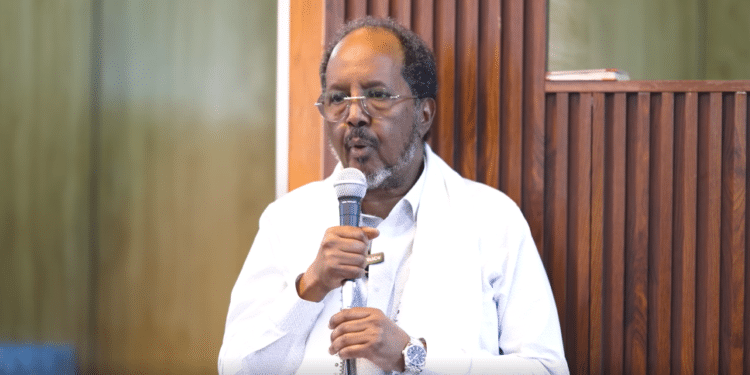On Friday, Somali President Hassan Sheikh Mohamud sparked controversy and raised eyebrows with his dismissal of reports claiming that Somalia faces an imminent security threat from Al-Shabab and other terrorists, labeling them as “foreign propaganda” and a “pro-terrorist narrative.” The president’s remarks came in response to a security warning issued by the U.S. embassy in Mogadishu, which had cautioned about the possibility of imminent attacks on the city’s airport.
Somali President Mohamud’s characterization of these reports as propaganda has drawn sharp criticism from security experts, opposition figures, and ordinary Somalis, who argue that the president’s stance is not only misguided but also dangerously out of touch with the realities on the ground. Many have pointed to the recent gains made by Al-Shabab in Middle Shabelle region, where the extremist group has taken control of several key towns and villages, as evidence of the growing threat posed by the group and the urgent need for a more proactive and coordinated response from the Somali government and its international partners.
The controversy surrounding Somali President Mohamud’s remarks has also reignited tensions between the Somali government and the United States, which has been a key partner in the fight against Al-Shabab and other extremist groups in the region. This is not the first time that the Mohamud administration has clashed with Washington over security assessments and warnings, with the Somali minister of defense last year labeling the U.S. as “bloodsucking enemies” in response to its assessment that years of progress in the fight against Al-Shabab had been rolled back by the group’s resurgence.
The U.S. Warning
The latest controversy began when the U.S. embassy in Mogadishu issued a security alert this week warning of possible imminent attacks on the city’s Aden Adde International Airport. The alert, which was shared on the embassy’s website, urged U.S. citizens and personnel to avoid the airport and its surrounding areas, and to exercise caution and vigilance in the face of the heightened threat level.
Despite the gravity of the threat and the credibility of the U.S. warning, however, Somali President Mohamud wasted no time in dismissing the reports as baseless and alarmist. In a speech delivered at his heavily fortified mosque in Villa Somalia in Mogadishu on Friday, the president accused unnamed foreign actors of spreading propaganda and sowing fear among the Somali population, and of promoting a “pro-terrorist narrative” that undermined the government’s efforts to restore peace and stability to the country.
President Mohamud’s remarks were met with a mix of surprise, anger, and disbelief among many Somalis, who saw them as a blatant attempt to downplay the severity of the security situation and to deflect attention away from the government’s own failings in addressing the threat posed by Al-Shabab. Many took to social media and other platforms to express their frustration and disappointment with the president’s stance, arguing that his dismissal of the U.S. warning was not only irresponsible but also dangerous, given the very real and present danger posed by the extremist group.
The Resurgence of Al-Shabab in Middle Shabelle
Somali President Mohamud’s dismissal of the U.S. security warning is all the more puzzling and concerning when viewed in the context of Al-Shabab’s recent resurgence in Middle Shabelle region, where the group has made significant gains and consolidated its control over key towns and villages in recent weeks.
According to local reports and security sources, Al-Shabab militants have launched a series of coordinated attacks on government and civilian targets in Middle Shabelle, seizing control of several strategic locations and inflicting heavy casualties on Somali security forces and local militias. The group has reportedly taken advantage of the vacuum left by the withdrawal of African Union Transition Mission in Somalia (ATMIS) troops from the region, as well as the weakness and disunity of the Somali government and its regional allies, to expand its presence and influence in the area.
Among the towns and villages that have fallen to Al-Shabab in recent weeks are Warciise, Lama garas, and Ceel Baraf. The group has also reportedly seized control of key infrastructure and resources in the area.
The resurgence of Al-Shabab in Middle Shabelle has raised alarm bells among security experts and political observers, who warn that the group’s gains in the region could have far-reaching consequences for the stability and security of the entire country. Many have pointed out that Middle Shabelle is a strategically important region, not only because of its proximity to Mogadishu but also because of its role as a key hub for trade, transportation, and agriculture in Somalia.







